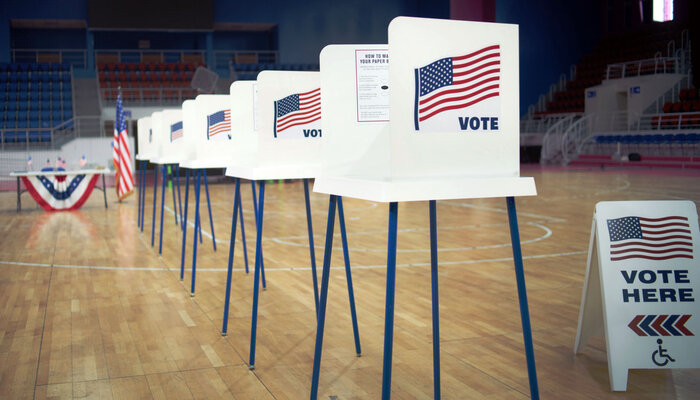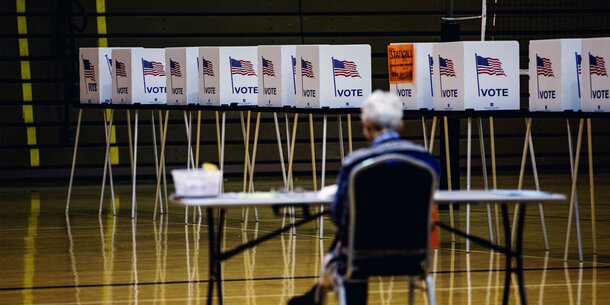Update: On July 24, the Supreme Court put the appeals court’s ruling on hold while it considers whether to take the case, restoring, at least temporarily, voters’ ability to go to court to challenge discriminatory voting policies under the Voting Rights Act.
A federal appeals court has suddenly ended the ability of voters in seven states to shield themselves against racial discrimination by suing under the Voting Rights Act of 1965. This month’s 2–1 ruling from the Eighth Circuit Court of Appeals flies in the face of Congress’s clear intent as well as numerous Supreme Court precedents. The decision covers voters in the middle of the country, including significant Native communities who have faced and are facing rampant discrimination in voting. It must be reversed.
In this case, Turtle Mountain Band of Chippewa Indians v. Howe, Native voters challenged a legislative map drawn by North Dakota politicians in 2021 as racially discriminatory. The Turtle Mountain Band of Chippewa, the Spirit Lake Tribe, and individual voters sued under Section 2 of the Voting Rights Act and a federal law known as Section 1983 alleging that the map weakened the voting rights of Native Americans.
Until a few years ago, everyone agreed that private citizens and groups could bring Section 2 lawsuits. For almost 60 years, individuals and groups have been bringing these cases to challenge policies and practices that make it harder for people of color to vote or that dilute the voting power of minority voters through discriminatory redistricting plans. Throughout this time, courts implicitly agreed that individuals and organizations could bring lawsuits under Section 2; litigants hotly debated the merits but courts consistently let voters try their cases.
Strong support for this proposition comes from decades of case law, the congressional record, and clear Supreme Court precedent. Since 1982, when the Voting Rights Act was strengthened, voters and organizations have brought hundreds of cases, as the Eighth Circuit’s chief judge noted in dissent in this case. As to the congressional record, one Senate report stated, “Congress depends heavily upon private citizens to enforce” Section 2.
The Supreme Court has ruled in favor of voters in Section 2 cases numerous times, including just two years ago in Allen v. Milligan. In recent years, individuals and groups have won crucial lawsuits under Section 2 to protect Black Alabamians, Latino Texans, and Native North Dakotans (including at the trial court in Turtle Mountain ). In the last five years, conservative appellate courts in the Fifth and Eleventh Circuits have also agreed that individuals and groups can sue.
However, some opponents of the Voting Rights Act have promoted a fringe notion that because Section 2 doesn’t say the words “private right of action” — the legal term for the ability of impacted individuals or groups to sue — such lawsuits cannot be filed. This is part of a pattern of attacking the procedures underlying Voting Rights Act litigation to make it virtually impossible to enforce the law’s important protections in court.
In 2023, the Eighth Circuit embraced the theory, rejecting all this evidence and finding that Congress did not intend to allow lawsuits from individuals and groups. But the court left open the door to voters bringing the same lawsuits under another part of federal law called Section 1983. That is, it did until now.
Section 1983 allows anyone to sue a government official who, in the course of doing their job, has violated the person’s civil rights, such as repression of free speech or police misconduct.
In this month’s ruling, the Eighth Circuit shut the door on Section 1983 as well. The statute only covers situations where the government interferes with individual rights, so the court decided that, in their view, Section 2 doesn’t create an individual right. The court’s astonishing conclusion is clear: it believes the Voting Rights Act doesn’t provide for a right to vote, despite past Supreme Court rulings to the contrary.
The Department of Justice can still bring Section 2 cases, but that alone is not enough to prevent voting discrimination. Individuals and groups have brought nearly 93 percent of Section 2 cases over the last 40 years. Justice Department attorneys have explained that the department relies on citizen-led lawsuits because it doesn’t have the resources to handle all these cases on its own even if it wanted to.
That desire is not present in the current administration’s Justice Department, which shed 70 percent of the Civil Rights Division staff and has already been ordered to dismiss almost all of its Section 2 cases. Several weeks ago, a DOJ memo announced that the division would instead focus its attention on conspiracy theories about the 2020 election.
In Arkansas, Iowa, Minnesota, Missouri, Nebraska, North Dakota, and South Dakota, state and local politicians are now unshackled from the constraints of Section 2’s ban on racial discrimination in voting. Voters have lost a core protection of the Voting Rights Act to stop violations.
The loss is particularly damaging for the Native communities in these states. Section 2 has led to a host of wins for indigenous voters, ranging from fairer electoral maps at the state and local level to more equitable access to early voting sites. A 2024 settlement in Nebraska against a county that Native voters had sued twice over the local government’s redistricting plans provided for a map that gave fair representation to Native voters. In 2006, an Eighth Circuit ruling prevented South Dakota from packing Native Americans into one statehouse district. Two cases filed in South Dakota 2012 and 2014 led to more equal access to early voting sites and registration for Oglala Sioux voters on the Pine Ridge Reservation. In the last 20 years, meanwhile, the Department of Justice brought only one lawsuit to enforce Native voting rights under Section 2.
The Eighth Circuit’s decision is wrong on the law, wrong on the history, and wrong morally. It must be overturned. Congress, meanwhile, should re-assert its leadership against voting discrimination and pass the John R. Lewis Voting Rights Advancement Act to modernize the Voting Rights Act and guarantee the freedom to vote for all Americans.



